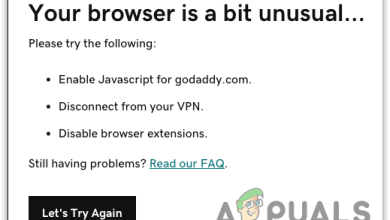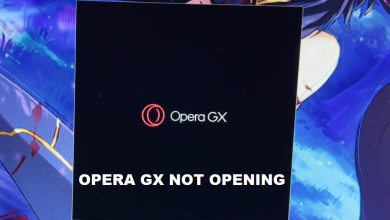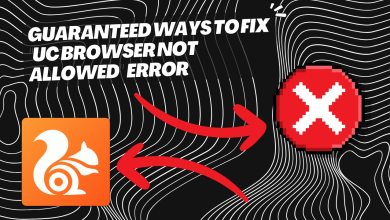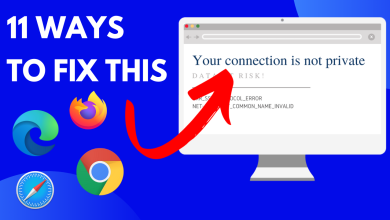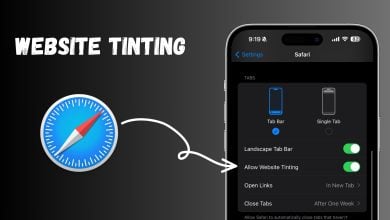How to Fix Error Code 232011 with JW Player
The Error code 23011 is typically encountered by Windows users when they attempt to play a video in their browser from an embedded JW player. The error code stands for ‘A manifest request was made without proper cross-domain credentials‘ and usually appears due to some kind of technical issue.
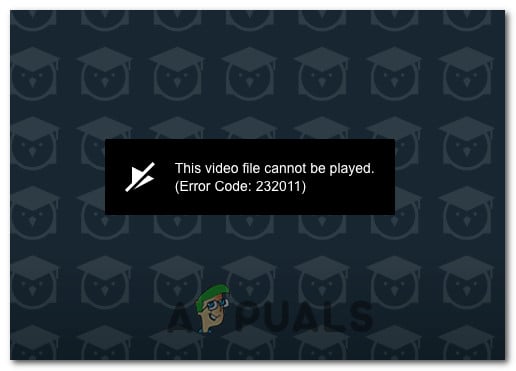
As it turns out, there are several different culprits that might be at the bottom of the apparition of this error code:
- Corrupted cache or cookie data – Corrupted temporary data or a badly saved cookie can also be responsible for this particular error code. If this scenario is applicable, you should be able to fix the problem entirely by clearing both the cache and the cookie.
- Proxy or VPN-cause interruption – It’s a well-known fact that JW Player is not that good with managing end-user connections that are being funneled through a VPN or a Proxy server. If this scenario is applicable, you should be able to fix the problem by disabling the built-in proxy server or by installing the system-level proxy or VPN client.
- Problematic extension – According to some affected users, this particular error code can also be caused by extensions and add-ons like Privacy Badger, Malwarebytes, or Avast Online Security. In this case, you can resolve the conflict with the JW player by disabling the problematic extension or add-on.
- Restricted network type – Corporate, school, and hotel networks might be specifically blocking Content Delivery Networks (CDN) such as the one that the platform behind JW Player uses. In this case, you can either try talking with the network administrator to remove the roadblock or you can connect to a different network.
- Browser incompatibility – Internet Explorer and Edge are two browsers that are still experiencing incompatibilities in relation to JW Player. You can eliminate the majority of inconsistencies by switching to a Chromium-based browser.
Method 1: Clearing your browser Cache and Cookies
As it turns out, one of the most common causes that might end up causing this problem is some type of corruption located inside the cache or cookie folder of the browser that you’re actively using. Keep in mind that there are several different problems that might occur due to corrupted temporary data left behind by the JW player and the Error code 23011 is one of them.
Fortunately, affected users have discovered that the problem can be fixed swiftly by accessing your browser settings and clearing the cache and the cookies. However, depending on the browser that you’re using, the exact steps of doing so will be different.
To help you with this, we’ve created a guide with 5 different sub-guides on clearing the cache and cookie of 5 of the most popular browsers (Chrome, Opera, Firefox, Microsoft Edge, and Internet Explorer).
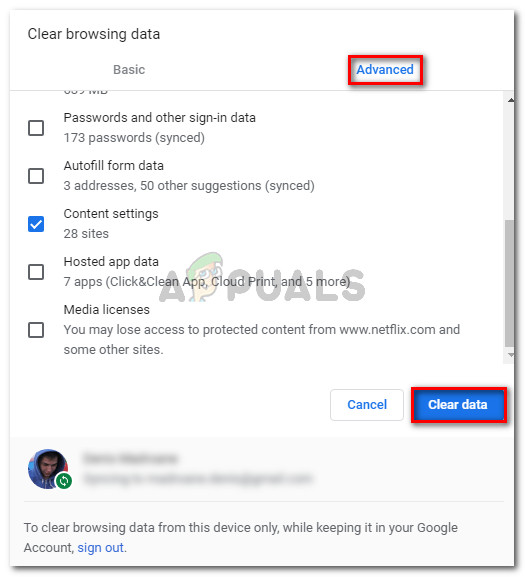
After you successfully manage to clean your browser cache and cookie, restart it and repeat the action that was previously causing the problem. In case the same Error code 23011 is still occurring, move down to the next potential fix below.
Method 2: Disable Proxy or VPN services
According to some affected users, connections bridged through the JW player can be interrupted with the 23011 error due to the fact that your network is currently going through a VPN or Proxy connection, which the webserver doesn’t like.
Some users that were facing the same problem have confirmed that they managed to fix the problem by disabling their proxy server, their VPN connection, or by uninstalling the system level VPN altogether.
To accommodate both potential scenarios, we created 2 different sub guides that will allow you to disable the proxy server (sub-guide A) or uninstall the VPN client (sub-guide B).
A. Disable Proxy Server
- Press Windows key + R to open up a Run dialog box. Next, type ‘inetcpl.cpl’ inside the text box, then press Enter to open up the Internet Properties tab.
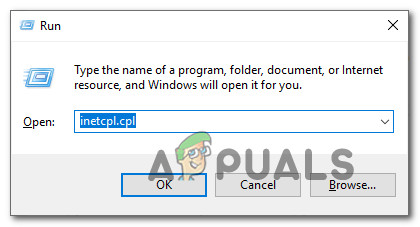
Opening the Internet Properties screen - Once you’re inside the Internet Properties tab, go over to the Connections tab from the horizontal menu at the top, then go ahead and click on LAN Settings (under Local Area Network LAN settings).
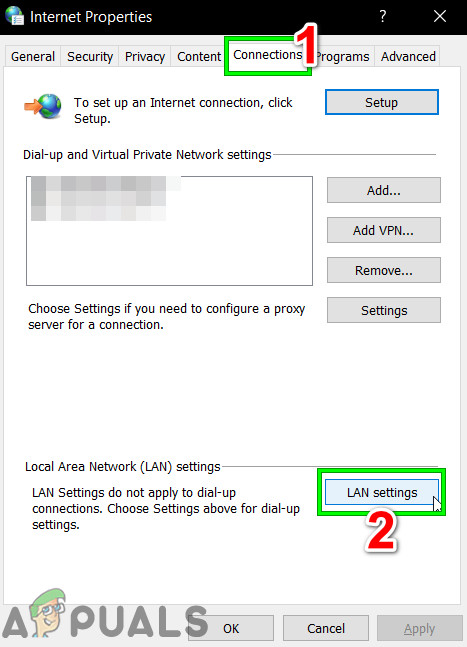
Open LAN settings in Internet Options - Inside the Settings menu of Local Area Network (LAN), go to the Proxy server category, then uncheck the box associated with the Use a proxy server for your LAN.
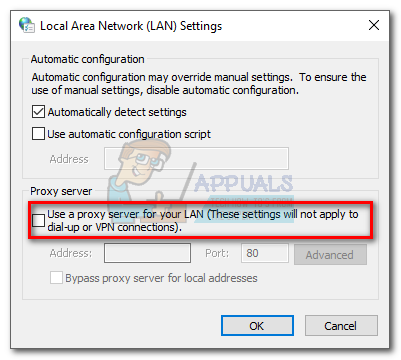
Disabling the Proxy server - After you have successfully disabled the Proxy server, restart your computer and see if the problem has been resolved at the next computer startup by repeating the action that was previously causing the Error code 2301.
B. Uninstall VPN client
- Open up a Run dialog box by pressing Windows key + R. Next, type ‘appwiz.cpl’ and press Enter to open up the Programs and Features screen. When you are prompted by the UAC (User Account Control), click Yes to grant administrative privileges.

Type appwiz.cpl and Press Enter to Open Installed Programs List - Inside the Programs and Features screen, scroll all the way down through the list of installed programs and locate the system-level VPN. When you see it, right-click on it, then click on Uninstall from the newly appeared context menu.

Uninstalling a VPN tool - Next, follow the on-screen prompts to complete the uninstallation, then restart your computer and see if the problem is fixed after the next startup is complete.
In case this scenario was not applicable or you’re still experiencing the same problem, move down to the next potential fix below.
Method 3: Disabling Privacy Badger or different extension/add-in
According to some Firefox and Google Chrome users, this problem can also occur due to an extension (on Chrome) or add-in (in Firefox). As it turns out, Privacy Badger and several other extensions/add-ins are known to interfere with JWPlayer and prevent it from streaming the video.
Generally, VPN/Proxy components and even some protection extensions such as Malwarebytes are known to cause this problem. Of course, there might be others that we didn’t cover, so you are required to do your own investigation and experimenting.
Once you have your potential culprit, follow one of the sub-guides below (A for Chrome and B for Firefox) to uninstall the problematic extension.
A. Disabling Extensions on Chrome
- On your Google Chrome browser, go ahead and click on the action button (top-right section of the screen).
- Once you’re inside the action menu, click on More Tools > Extensions to open the extension tab of Google Chrome.
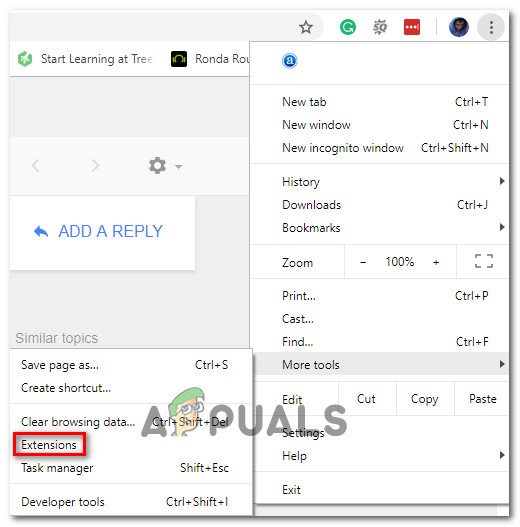
Accessing the extensions tab - Once you’re inside the Extensions menu, scroll all the way down through the list of installed extensions and locate the extension that you want to uninstall.
- When you find it, click once on the google associated with the problematic extension to disable it.
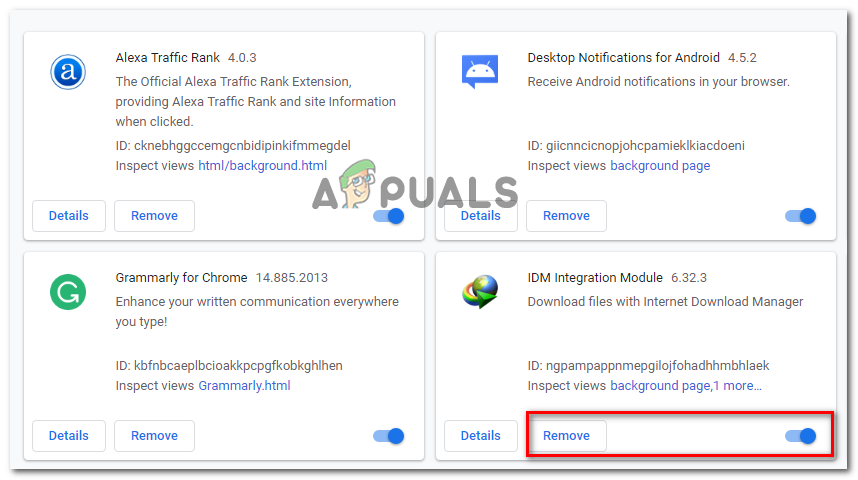
Disabling or uninstalling the IDM Integration module extension - Once the extension has been disabled, restart Google Chrome and see if the problem is now fixed.
B. Disabling Extensions (Add-ons) on Firefox
- Open Firefox and click on the action button in the top-right corner of the screen.
- Once you get to the next menu, click on Add-ons from the list of available options.

Click on Add-ons options. - Inside the Add-ons tab, click on Extensions from the menu on the left, then go ahead and disable the toggle associated with the extension that you suspect might be interfering with the Netflix app.
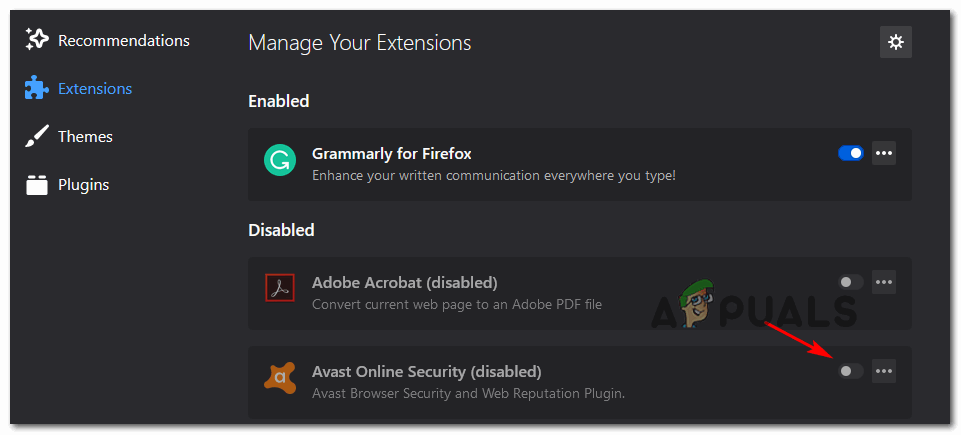
Disabling the problematic extension - Once the extension has been disabled, restart your browser and see if the problem is now fixed.
If the problem is still not fixed, move down to the next potential fix below.
Method 4: Switching to a Different Network (if applicable)
If you’re only experiencing this issue while you’re connected to a limited network (corporate, state or school), it’s possible that the network administrators have decided to block access to the content delivery network (CDN) that the JW Player actively uses.
If this scenario is applicable, you have two different potential ways of fixing the problem:
- Connect to a different network (with no restrictions) and see if the same problem is still occurring. The easiest way to test out this theory is to connect to your home network and recreate the same scenario that’s currently causing the problem.
- Talk to your network administrator and ask them if access to CDN networks (such as the one used by JW Player) is blocked. If it is, they can whitelist this particular instance so that you’ll no longer have issues playing JW embedded content.
If this scenario is not applicable, move down to the final fix below.
Method 5: Using a Different Browser (if applicable)
If you’re using a less-popular browser, you might want to try a different alternative. Although JW player is theoretically compatible with every browser currently on the market, there are a lot of reported issues with less popular browsers that aren’t Chromium-based (Internet Explorer & Edge from example).
If you are willing to make a change, consider making the switch to Chrome, Opera, or Brave and see if the error code 23011 is now resolved.
